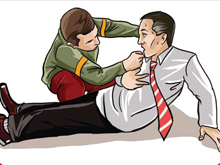Health Topics
-
Healthy Living
-
|
|
June 2010
|
| 7 Symptoms of a Heart Attack |
| Dr Parthiban T |
| |
 |
Many people think a heart attack is sudden and intense, like they show in the movies – where a person clutches his chest and falls over. The truth is that many heart attacks start slowly, as a mild pain or discomfort. |
The heart beats 70 times a minute on an average, to push blood around the body. Like any busy muscle, the heart tissues need good supply of blood from their blood vessels, which are called the coronary arteries. A heart attack occurs when blood flow to part of the heart is blocked. This is often by a blood clot, causing damage to the affected muscle, usually caused by a hardening of the artery walls, called atherosclerosis. The clot is often caused by the presence of plaque in an artery.
Beware of Angina
Chest discomfort following exertion like exercise, slope climbing or lifting a heavy weight is called angina, and is likely to be the first warning of blocked coronary arteries. Angina is a protest from the heart muscle that it is not getting enough oxygen because of diminished blood supply.
A heart attack is simply the extreme state of oxygen deprivation, in which regions of heart muscle cells begin to die for lack of oxygen. The pain of angina generally goes away when you stop exerting yourself. It is vital to seek medical attention quickly if you feel this sort of pressing pain or heaviness.
7 warning signals
- Uncomfortable pressure, fullness, squeezing or pain in the centre of the chest lasting more than a few minutes.
- Pain spreading to the shoulders, neck or arms. The pain may be mild to intense. It may feel like pressure, tightness, burning or heavy weight. It may be located in the chest, upper abdomen, neck, jaw or inside the arms or shoulders.
- Chest discomfort with light headedness, fainting, sweating, nausea or shortness of breath.
- Anxiety, nervousness and/or cold, sweaty skin.
- Paleness.
- Increased or irregular heart rate.
- Feeling of impending doom.
Some people, when experiencing such symptoms, tend to overlook it. Ignoring the messages your body is trying to reach you is the worst thing you can do. Call the Emergency (1099, for example) or get through to a cardiologist immediately.
|
Doctor’s Clues
How does the doctor know if you have had a heart attack? Your doctor diagnoses a heart attack by studying the results of several tests:
- Review of the patient’s complete medical history.
- Do a physical examination.
- Use an ECG to discover any abnormalities caused by damage to the heart.
- Use a blood test to detect abnormal levels of certain enzymes in the blood.
|
|
 |
Dr.Parthiban T. Consultant Cardiologist at Apollo Medical Centre, Muscat |
|
|